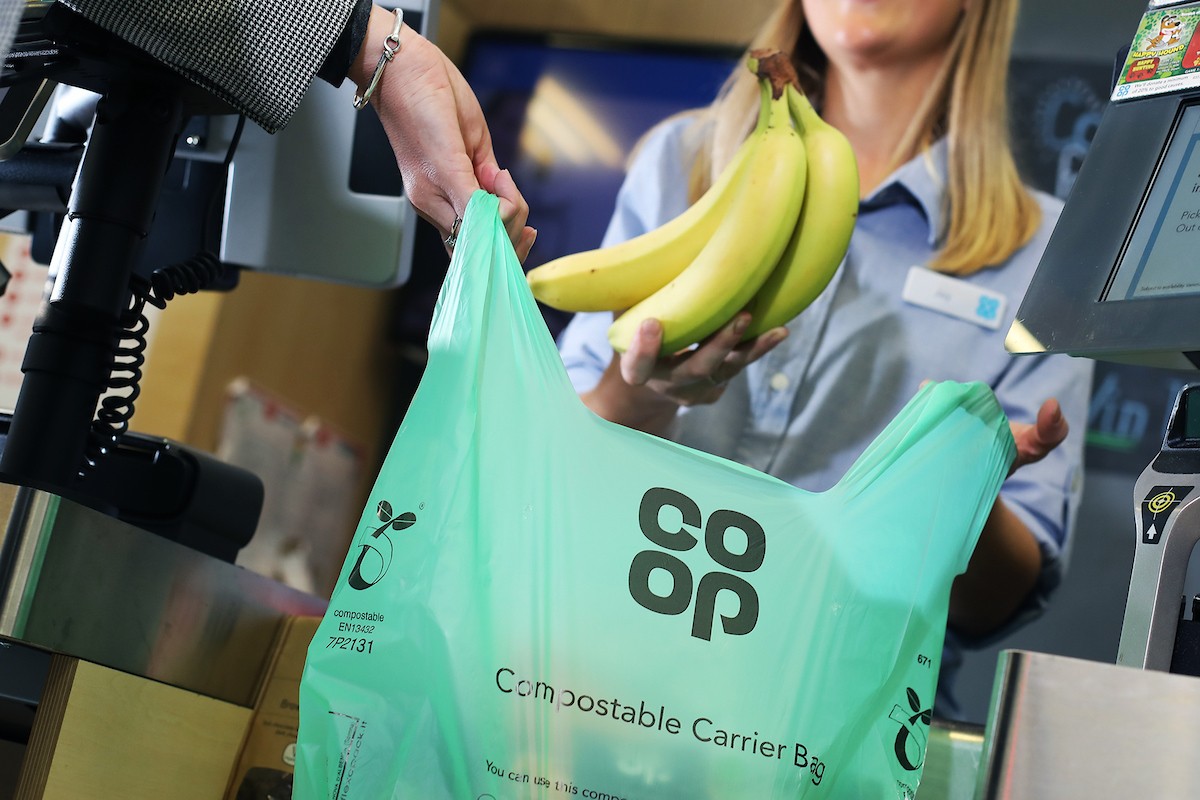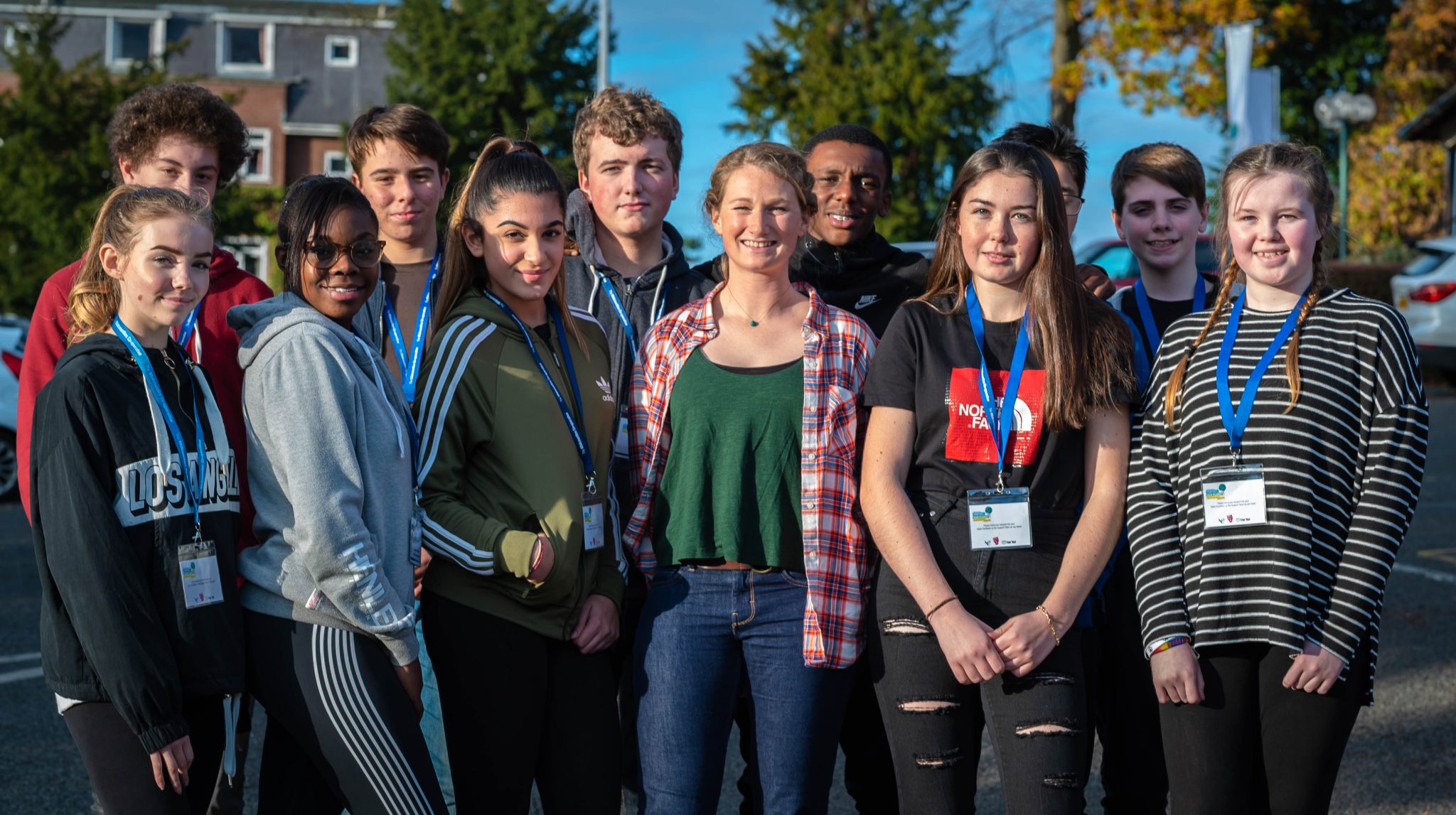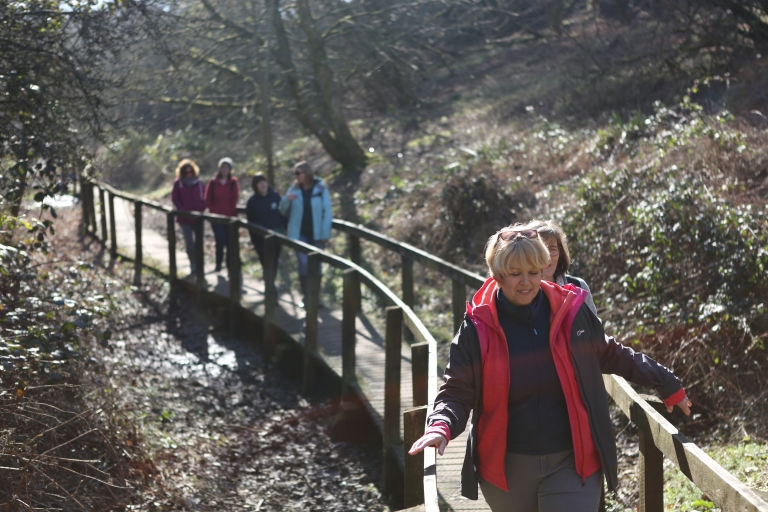With the environmental impact becoming increasingly more important for consumers in the UK, food retailers are under pressure to increase transparency.
A sustainability report by Global Data showed that those who are most likely to purchase more frequently are often more engaged with sustainability and ethics, as many consumers wish to pass the responsibility on to retailers.
Another report by the Environmental Investigation Agency and Greenpeace UK, Checking out on Plastics, argues the country’s top 10 supermarkets are flooding the planet with 810,000 tonnes of single-use plastic every year.
Co-operative retailers have introduced a series of measures designed to tackle environmental issues.
According to Checking out on Plastics, when calculated as a percentage of their overall market share, the Co-op Group has the lowest plastic packaging footprint of all retailers – at under 5,000 tonnes. However, the report notes that in general, retailers have a greater focus on recycling than reduction.
“Co-op leads the way on how much of their own brand packaging is widely recyclable by weight (79%), with most others lagging behind at 58 -70%,” reads the report, praising the retailer for also being one of the four supermarkets reporting on their plastic packaging footprint.
The Co-op Group
In its 2018 report The Co-op Way, the Co-op Group outlines its ethical, social and environmental priorities. When it comes to environmental impact, the report focuses on three areas of performance: climate change, waste and resource use.
The Group’s plans include having all its own-brand packaging easy to recycle by 2023 (80% by 2020). It has pledged to eliminate single-use own-brand plastic products and packaging by 2023 and to use at least 50% recycled plastic in its polyethylene terephthalate pots, trays and punnets, and in its high-density polyethylene bottles, by 2021. It defines ‘single-use’ plastics as those that cannot be recycled.
As part of its campaign to tackle plastic waste, the Group announced it would work with partners to improve recycling rates and help customers reuse and recycle easily.

The Group also led the way in developing compostable carrier bags and sharing the technology. It was the first supermarket to make the 5p, not-for-profit bags widely available, in over 1,000 of its food stores UK-wide. They have so far replaced around 60 million single-use plastic bags in its food stores alone.
The initiative has inspired a project in Greater Manchester, making similar bags available to all retailers operating within the 10 boroughs of the Greater Manchester Combined Authority. Regional independent societies – including Southern and Central England Co-operative – are also rolling out the compostable carrier bags in their stores where the local authority collects household food
waste recycling.
Marcus Gover, CEO of Waste and Resources Action Programme (WRAP), says: “We absolutely need to explore innovative ways of tackling plastic pollution, but there is a balance to ensure initiatives are well thought through and avoid unintended consequences.
“I’m pleased to see this reflected in the Co-op’s approach to its compostable carrier bag initiative by carefully designing an approach that aligns with existing local collection systems. By everyone moving in the right direction, we can transform the plastic system in the UK and keep plastic in the economy and out of the environment.”
Related: How co-ops can help communities guard against climate change
Recently, the Co-op Group has also revealed a 29% reduction in its food waste, as the convenience store retailer moves towards halving its waste by 2030. Its food waste strategy aims to prevent it being created in the first place, alongside improved processes to donate unsold food to local groups.
David Moon, head of Business Collaboration at WRAP, said: “WRAP is delighted with the progress Co-op has made in significantly reducing its operational food waste since 2015. The decision to publish its food waste data for the first time, underscored by a commitment to continued measuring and action on food waste, exemplifies best practice required by all retailers, food manufacturers and others connected with food production and sale. This is exactly the sort of business action we need to happen.
“By measuring unsold food, Co-op Food Group is equipped to focus on the opportunities to reduce and redistribute any surpluses; to avoid food being wasted and cut costs. Overall, this will help contribute towards UK and global initiatives to fight food waste including the Courtauld Commitment 2025 and UK Food Waste Reduction Roadmap; and ultimately the UN’s Sustainable Development Goal 12.3.”
In terms of its carbon footprint, 100% of the Co-op Group’s electricity already comes from renewables. The retailer achieved a 33% reduction in its direct GHG emissions since 2016.
Going forward, the Co-op Way Report sets a target to reduce both direct and indirect emissions, in line with the reductions needed to keep global warming to below 2°C, a threshold for some of the most dangerous impacts of climate change. The Co-op plans to halve its direct emissions again by 2025, through a multimillion pound investment in natural refrigeration and associated technologies, as well as low-energy LED lighting.
Yet a greater challenge remains dealing with the emissions it does not create directly. The Co-op is currently in the process of mapping the GHG footprint of its entire value chain (from suppliers right through to waste disposal) and will share this in detail next year, along with our steps taken to reduce this impact.
As a signatory of the Courtauld 2025 Commitment, the retailer also pledges to cut system-wide waste and GHG emissions associated with food and drink by at least one fifth by 2025. It has extended its carbon offset offer to cover all new home and motor policies purchased through Co-op Insurance at no extra cost to our customers, funding carbon reduction projects in the developing world. To date these projects have avoided 1.32 million tonnes of GHG emissions.
The Group also aims to reduce water consumption across its properties by 10% by 2025 compared to 2016.
Sourcing is another area the retailer is focusing on, examining the impact it might have on the natural environment and biodiversity. It has set the target of increasing increase the number of Marine Stewardship Council-label products sold and ensuring palm oil used in all Co-op branded products comes from a sustainable, segregated Certified Sustainable Palm Oil source by 2020.
The Co-op is also currently developing a Responsible Soy roadmap reviewing usage directly in products and in animal feed.
Earlier in May the Co-op’s charity, the Co-op Foundation launched a new £1m fund to enable groups in Wales with a community and environmental focus to safeguard spaces and become more sustainable.
The fund is financed by proceeds from the 5p single-use carrier bag charge in the Co-op’s Welsh food stores. As part of the scheme, Welsh groups can apply for grants of up to £10,000 to explore enterprising ideas that could contribute to a more sustainable future for their community space. They can also receive interest-free loans of up to £50,000 to put their idea into action.
The Co-op showcased some of its commitments around the environment in pledges made on the Coopsfor2030 platform – the International Co-operative Alliance (ICA) initiative that brings together the full extent of the global co-operatives’ commitment in support of the UN’s Sustainable Development Goals.
The Midcounties Co-operative
The Midcounties Co-operative is taking similar measures to reduce plastic waste. Last year, it launched a new Sustainable Communities programme, working with more than 200,000 members, as well as 50 schools and community groups, to reduce CO2 emissions, promote energy efficiency and encourage greener living. And this year, it has started a new campaign, 1Change, designed to empower members up and down the country to make one change and live a greener lifestyle.
Midcounties has also recently appointed a chief values officer, Pete Westall; this is a new role created to maximise the positive impact the society is making with members and communities through campaigns such as 1Change.
A recent member survey revealed that 94% of Midcounties’ members that responded saw plastic waste as a major concern. Fronted by activist Cal Major, the campaign aims to raise awareness of plastic pollution.
Ms Major founded the environmental movement Paddle Against Plastic and last year paddle-boarded the length of the UK to raise awareness about the amount of plastic waste in our oceans. She is now environmental ambassador at Midcounties.
She said: “We all have the power to reduce the amount of plastic waste that ends up in landfill and in our oceans by taking action and committing to one small change.
“I’m proud to be an environmental ambassador for Midcounties and hope that the 1Change campaign can help to change people’s mindsets about plastic usage by highlighting the simple, everyday life choices we can all make that will have a lasting impact.”
Related: Bee saviour sugar cards give energy boost to exhausted bees
In line with the campaign’s objectives, Midcounties has introduced signs throughout the aisles of larger food stores to inspire shoppers to make sustainable purchasing decisions, including using a bag-for-life, and buying loose fruit and vegetables.

As part of the campaign, Midcounties will also be visiting around 50 schools with its Plastic is Not Fantastic educational programme.
Like the Co-op Group, the Midcounties Co-operative has joined the International Co-operative Alliance’s Co-opsfor2030 campaign, where it has publicly pledged to improve its overall energy efficiency by 20% by 2030.
The society has set a number of waste reduction targets, including reducing the waste produced in its operations by 20% by 2022 and maintaining its 99% recycling rate and diverting 3,000 tonnes of waste from landfill as a result.
It also has plans to remove single-use carrier bags from selected stores and introduce opportunities for customers to bring in refillable containers.
The Southern Co-operative
Another retailer that has expressed support for the UN’s sustainable development agenda is the Southern Co-operative.
Its pledges around the environment focus on reducing carbon emissions, preventing waste, enhancing the natural environment and use resources wisely.
Southern aims to reduce absoluteCO₂ emissions by 20% by 2022 (against 2017 baseline), with an initial focus on refreshing its energy sourcing and management strategy. The society reported a 16% decrease in emissions in 2018, compared with the previous year.
The society has set up an Energy Steering Group responsible for developing and delivering a new strategic energy management plan with the aim of maximising cost efficiencies and reducing operational environmental impacts.
Related: Feed-in tarrifs have been axed – so what other help is there for green energy co-ops?
To reduce its overall environmental operating impact, the society replaced refrigeration gas and leak detecting systems leading to a 20% reduction in CO₂e emissions associated with fugitive emissions.
Another measure saw the launch of a pilot PV scheme in four locations in East Devon. It is expected that the four initial solar panel installations will reduce CO₂e emissions by 17 tonnes in year one and up to 375 tonnes over the projected 25-year lifespan of the panels. The society will consider further locations in 2020.

In terms of tacking plastic waste, the retailer has removed all single use plastic straws from sale. A new lightweight bag was introduced in early 2019, a substitute for the standard plastic single use carriers.
Developed by the Co-op Group, the bags are made available to Southern Co-op through the the Federal Retail Trading Services, the central buying group for co-operative retail societies in the United Kingdom.
They’re initially available in 74 stores where compostable bags are accepted in local council food waste collections.
In March the Southern Co-op funded Dorset Wildlife Trust to launch a new health and wellbeing project, ‘Natural Sparkle’. The project will provide a suite of nature-based activities that benefit both physical and mental wellbeing for local people and will also help wildlife in the area.
Gemma Lacey, Southern Co-op’s director of sustainability and communications, said: “The work carried out by our Wildlife Trusts is absolutely incredible and gives people an opportunity to connect with our natural world. This project will bring a variety of positive impacts improving people’s health and wellbeing while also benefitting nature.
“Being a regional, independent co-operative, improving our local communities is incredibly important to us and this is an exciting move forward in our commitment to securing a more sustainable future for everybody.”
And since 2013 the Southern Co-op has been working with Hampshire and Isle of Wight Wildlife Trust to ensure its Oaks crematorium in Havants – whose grounds include ancient woodland – makes a positive difference to the local environment.
Five years on, monitoring reports have observed a total of 90 botanical species within the meadow and 135 species of plants across the site.
“As we celebrate The Oaks’ fifth anniversary, we can also celebrate the success of being able to make a real improvement to biodiversity on the site. This is just one of many things we are proud to be doing to support the local and global sustainability agenda and a small action which we hope will inspire other businesses to get involved,” said Ms Lacey.
Sarah Jackson, senior ecologist at Arcadian Ecology, added: “It’s been great working with Southern Co-op to make The Oaks more wildlife-friendly. Our surveying to monitor the progress towards the Biodiversity Action Plan we produced on behalf of Southern Co-op, has found that changes to the way they look after the woodland and pond, and the creation of a wildflower meadow has resulted in big improvements to the range of species the site supports.
“This includes the number of plants recorded nearly doubling in the past two years. This is a fantastic example of how organisations can do their bit for wildlife on their patch, and help create a network of nature-rich spaces across our county for wildlife to recover and thrive.”
While these case studies show co-operative retailers are taking action, the report by Greenpeace and the Environmental Investigation Agency suggests that more can be done in terms of tackling plastic waste. It encourages retailers to introduce or expand refillable and unpackaged ranges.